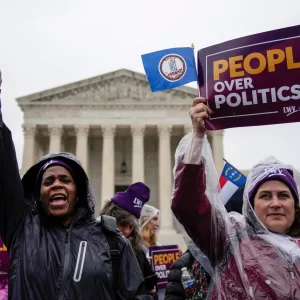The 6-to-3 majority dismissed the “independent state legislature” theory, which would have given state lawmakers nearly unchecked power over federal elections.
The Supreme Court on Tuesday rejected a legal theory that would have radically reshaped how federal elections are conducted by giving state legislatures largely unchecked power to set rules for federal elections and to draw congressional maps warped by partisan gerrymandering.
The vote was 6 to 3, with Chief Justice John G. Roberts Jr. writing the majority opinion. The Constitution, he said, “does not exempt state legislatures from the ordinary constraints imposed by state law.”
Justices Clarence Thomas, Samuel A. Alito Jr. and Neil M. Gorsuch dissented.
The decision followed other important rulings this term in which the court’s three liberal members were in the majority, including ones on the Voting Rights Act, immigration and tribal rights. Though some of the biggest cases are still to come, probably arriving by the end of the week, the court has so far repeatedly repudiated aggressive arguments from conservative litigants.
The case concerned the “independent state legislature” theory. It is based on a reading of the Constitution’s Elections Clause, which says, “The times, places and manner of holding elections for senators and representatives shall be prescribed in each state by the legislature thereof.”
Proponents of the strongest form of the theory say this means that no other organs of state government — not courts, not governors, not election administrators, not independent commissions — can alter a legislature’s actions on federal elections.
Chief Justice Roberts rejected that position. “The Elections Clause does not insulate state legislatures from the ordinary exercise of state judicial review,” he wrote.
The ruling soundly dismissed the theory, one that an unusually diverse array of lawyers, judges and scholars across the ideological spectrum viewed as extreme and dangerous. Adopting the theory, they warned, could have profound consequences for nearly every aspect of federal elections, including by erasing safeguards against partisan gerrymandering and curtailing the ability to challenge voting restrictions in state courts.
But some election law specialists cautioned that Tuesday’s decision elevated the power of federal courts in the process, allowing them to second-guess at least some rulings of state courts based on state law.
“This gives the U.S. Supreme Court the ultimate say over the meaning of state law in the midst of an election dispute,” Richard L. Hasen, a law professor at the University of California, Los Angeles, wrote in a blog post. “This is a bad, but not awful, result.”
Others said the decision was a nearly complete victory and a resounding reaffirmation of the status quo. “I see no evidence of interest by the Supreme Court to make mischief here,” said Vikram David Amar, the dean of the University of Illinois College of Law.
As Chief Justice Roberts put it, “state courts do not have free rein” and are subject to oversight by federal courts in cases involving federal elections. But he said quite little about the nature and extent of that oversight.
“The questions presented in this area are complex and context-specific,” the chief justice wrote. “We hold only that state courts may not transgress the ordinary bounds of judicial review such that they arrogate to themselves the power vested in state legislatures to regulate federal elections.”
Justices Sonia Sotomayor, Elena Kagan, Brett M. Kavanaugh, Amy Coney Barrett and Ketanji Brown Jackson joined the chief justice’s majority opinion……..
